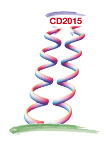Speaker
Daniel Phillips
(Ohio University, Athens)
Description
I will show that combining effective field theories (EFTs) with Bayesian data analysis facilitates the rigorous quantification of theoretical uncertainties [1]. Bayesian methods are sometimes attacked on the grounds that the use of priors produces a subjective result. I will argue that, in fact, incorporating priors in the analysis permits the consistent application of analysis assumptions that are otherwise only implicit or imposed in an ad hoc way. In a Bayesian framework such assumptions can then be tested, and, if necessary, modified in light of new information.
In this talk the general framework for incorporating Bayesian priors that encode the expectation that low-energy coefficients (LECs) in the EFT are natural will first be presented. Applications such as:
-computation of higher-order uncertainties in chiral EFT calculations of NN scattering [2];
-the extraction of low-energy constants in toy models designed to mimic EFTs with both natural and unnatural coefficients [3];
-the extrapolation of lattice data on the nucleon mass to the physical pion mass
will be discussed.
This work was performed by the BUQEYE collaboration and is supported by the National Science Foundation and the US Department of Energy.
[1] A recipe for EFT uncertainty quantification in nuclear physics, R.J. Furnstahl, D.R. Phillips, S. Wesolowski, J. Phys. G42 (2015) 3, 034028.
[2] R.J. Furnstahl, N. Klco, D.R. Phillips, S. Wesolowski, in preparation.
[3] S. Wesolowski, N. Klco, A. Thapaliya, R. J. Furnstahl, D. R. Phillips, in preparation.
Author
Daniel Phillips
(Ohio University, Athens)

